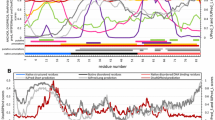Abstract
We are concerned with a problem of checking the structure freeness of S + for a given set S of DNA sequences. It is still open whether or not there exists an efficient algorithm for this problem. In this paper, we will give an efficient algorithm to check the structure freeness of S + under the constraint that every sequence may form only linear secondary structures, which partially solves the open problem.
Access this chapter
Tax calculation will be finalised at checkout
Purchases are for personal use only
Preview
Unable to display preview. Download preview PDF.
Similar content being viewed by others
References
Adleman, L.: Molecular computation of solutions to combinatorial problems. Science 266, 1021–1024 (1994)
Andronescu, M., Dees, D., Slaybaugh, L., Zhao, Y., Condon, A., Cohen, B., Skiena, S.: Algorithms for testing that sets of DNA words concatenate without secondary structure. In: Hagiya, M., Ohuchi, A. (eds.) DNA 2002. LNCS, vol. 2568, pp. 182–195. Springer, Heidelberg (2003)
Arita, M., Kobayashi, S.: DNA sequence design using templates. New Generation Computing 20, 263–277 (2002)
Bellman, R.: On a routing problem. Quarterly of Applied Mathematics 16(1), 87–90 (1958)
Ben-Dor, A., Karp, R., Schwikowski, B., Yakhini, Z.: Universal DNA tag systems: A combinatorial design scheme. In: Proc. of the 4th Annual International Conference on Computational Molecular Biology (RECOMB 2000), pp. 65–75 (2000)
Brenneman, A., Condon, A.E.: Strand design for bio-molecular computation (Survey paper). Theoretical Computer Science 287, 39–58 (2002)
Deaton, R., Garzon, M., Rose, J.A., Franceschetti, D.R., Murphy, R.C., Stevens Jr., S.E.: Reliability and efficiency of a DNA based computation. Physical Review Letter 80, 417–420 (1998)
Frutos, A.G., Liu, Q., Thiel, A.J., Sanner, A.M.W., Condon, A.E., Smith, L.M., Corn, R.M.: Demonstration of a word design strategy for DNA computing on surfaces. Nucleic Acids Research 25(23), 4748–4757 (1997)
Ford Jr., L.R., Fulkerson, D.R.: Flows in Networks. Princeton University Press, Princeton (1962)
Garzon, M., Deaton, R., Rose, J.A., Franceschetti, D.R.: Soft molecular computing. In: Proc. of Fifth International Meeting on DNA Based Computers, June 14-15, pp. 89–98. MIT, Cambridge (1999)
Garzon, M., Neathery, P., Deaton, R., Murphy, R.C., Franceschetti, D.R., Stevens Jr., S.E.: A new metric for DNA computing. In: Proc. of 2nd Annual Genetic Programming Conference, pp. 472–478. Morgan Kaufmann, San Francisco (1997)
Hagiya, M.: Towards molecular programming. In: Ciobanu, G. (ed.) Modeling in Molecular Biology. Natural Computing Series, Springer, Heidelberg (2003) (to appear)
Hofacker, I.L., Fontana, W., Stadler, P.F., Bonhoeffer, L.S., Tacker, M., Schuster, P.: Fast folding and comparison of RNA secondary structures (The Vienna RNA package). Monatshefte für Chemie 125, 167–188 (1994)
Kobayashi, S., Kondo, T., Arita, M.: On template method for DNA sequence design. In: Hagiya, M., Ohuchi, A. (eds.) DNA 2002. LNCS, vol. 2568, pp. 205–214. Springer, Heidelberg (2003)
Rose, J.A., Deaton, R., Garzon, M., Franceschetti, D.R., Stevens Jr., S.E.: A statistical mechanical treatment of error in the annealing biostep of DNA computation. In: Proc. of GECCO 1999 conference, pp. 1829–1834 (1999)
Rose, J.A., Deaton, R.: The fidelity of annealing-ligation: a theoretical analysis. In: Proc. of 6th International Meeting on DNA Based Computers, pp. 207–221 (2000)
Sankoff, D., Kruskal, J.B., Mainville, S., Cedergren, R.J.: Fast algorithms to determine RNA secondary structures containing multiple loops. In: Sankoff, D., Kruskal, J. (eds.) Time Warps, String Edits, and Macromolecules: The Theory and Practice of Sequence Comparison, Ch. 3, pp. 93–120 (1983)
Zuker, M., Steigler, P.: Optimal computer folding of large RNA sequences using thermodynamics and auxiliary information. Nucleic Acids Research 9, 133–148 (1981)
Author information
Authors and Affiliations
Editor information
Editors and Affiliations
Rights and permissions
Copyright information
© 2003 Springer-Verlag Berlin Heidelberg
About this chapter
Cite this chapter
Kobayashi, S., Yokomori, T., Sakakibara, Y. (2003). An Algorithm for Testing Structure Freeness of Biomolecular Sequences. In: Jonoska, N., Păun, G., Rozenberg, G. (eds) Aspects of Molecular Computing. Lecture Notes in Computer Science, vol 2950. Springer, Berlin, Heidelberg. https://doi.org/10.1007/978-3-540-24635-0_19
Download citation
DOI: https://doi.org/10.1007/978-3-540-24635-0_19
Publisher Name: Springer, Berlin, Heidelberg
Print ISBN: 978-3-540-20781-8
Online ISBN: 978-3-540-24635-0
eBook Packages: Springer Book Archive




